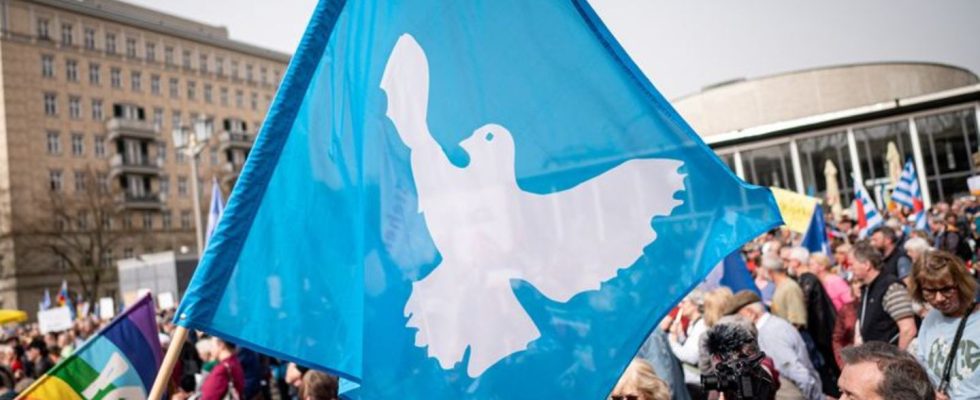Conflicts
Easter marches dedicated to the Ukraine and Gaza wars
A flag with the dove of peace can be seen at the traditional Easter march in Berlin. photo
© Fabian Sommer/dpa
Holy Saturday is the main day of action for the traditional Easter marches. At the same time as the demonstrations, the government is urgently calling for continued support for Ukraine, which is being attacked by Russia.
According to preliminary information from the Peace Cooperative Network, several thousand people nationwide have taken part involved in Easter marches. “We are satisfied with the participation,” said network spokesman Kristian Golla. The number is roughly the same as last year.
According to a preliminary overview by the peace cooperative, more than 10,000 people took to the streets across Germany for peace and disarmament. The largest marches took place in Berlin with around 3,500 participants, in Stuttgart with around 2,000 and in Bremen with around 1,000 people. Around 700 people took part in Cologne and 500 in Munich, said Golla. According to the network, around 70 events were planned nationwide on Holy Saturday.
According to the organizers, the central themes of this year’s Easter marches, which have the motto “Now more than ever – together for peace”, are demands for diplomatic solutions in Russia’s war of aggression against Ukraine, which violates international law, and in the Gaza war, nuclear disarmament and criticism of increasing arms spending.
Scholz: Do the same for our security
“We all long for a more peaceful world,” said Chancellor Olaf Scholz (SPD) in a published video message. But peace without freedom means oppression, there is no peace without justice. “That’s why we support Ukraine in its fight for a just peace – as long as it is necessary. We also do this for ourselves, for our security.”
Vice Chancellor Robert Habeck (Greens) also released a video and said, “We support Ukraine not just out of solidarity or compassion, but in the interests of Germany and Europe.” Putin wants to destroy the unity and unity of Europe. If he succeeds in his war in Ukraine, he will continue. “We long for peace. Yes. But the honest, bitter answer is: There probably won’t be a quick, good end, even if we wish otherwise,” said Habeck. In view of Russian aggression, he emphasized: “We have to prepare for the threat situation. Anything else would be naive.”
Federal Foreign Minister Annalena Baerbock (Greens) told the newspapers of the Funke media group that reality cannot be ignored. “(…) If Ukraine can no longer defend itself because we don’t supply it with enough weapons, Putin’s troops will be at the Ukrainian-Polish border tomorrow – just eight hours’ drive from Berlin. Ukraine also secures our peace.”
Lindner: Putin wants power over us
Federal Finance Minister Christian Lindner also warned of a decline in support for Ukraine. “Our peace and our freedom are threatened. Putin is not just concerned with Ukraine, he wants to change the order of peace and freedom in Europe,” the FDP leader told the “Kölner Stadt-Anzeiger”. “He wants power over us in order to control our way of life and our prosperity. Anyone who gets tired of supporting Ukraine because it is too strenuous or too expensive should consider the consequences. The danger of war would come closer to us. “
Former Federal President Joachim Gauck told the editorial network Germany, “Anyone who thinks that this is not our war and that the costs are too high may have a rude awakening. If we do not help Ukraine to defend itself and push back the aggressor, then things will end “The European peace order as a whole is beginning to falter – with unforeseeable consequences for other countries as well.”
Opposition leader Friedrich Merz wrote in his weekly email to his supporters that demonstrating for peace was anything but reprehensible. “We all want peace and, above all, freedom for our country and for all of Europe. But we still have to talk about the conditions for lasting peace, and peacefulness alone is not a sufficient answer.” There could be peace immediately if Putin silenced the weapons. “It would therefore be very desirable that the Easter marchers this year would primarily address Putin and his regime in Moscow and call on him to immediately end the war of aggression against Ukraine,” wrote the CDU leader.
Against a “freezing” of war
Habeck, Baerbock, Lindner, Merz and Gauck opposed a possible freezing of the war in Ukraine. SPD parliamentary group leader Rolf Mützenich brought this up and drew criticism. “For Ukraine, it’s about existence as a state. And for the people, it’s often about sheer survival. You can’t freeze a situation like this,” said Lindner. He asked a counter question: “How would it affect us if the French National Assembly were to consider freezing a conflict if the enemy were in Chemnitz?” Gauck said: “Freezing didn’t work in 2014 with the Minsk Agreement.” It would bring profits for Putin, he would keep conquered land, could rearm in peace and then strike again.

